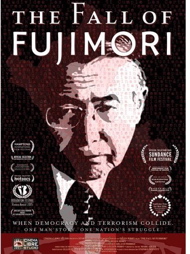| Release List | Reviews | Price Search | Shop | Newsletter | Forum | DVD Giveaways | Blu-Ray/ HD DVD | Advertise |
| Reviews & Columns |
|
Reviews DVD TV on DVD Blu-ray International DVDs Theatrical Reviews by Studio Video Games Features Collector Series DVDs Easter Egg Database Interviews DVD Talk TV DVD Talk Radio Feature Articles Columns Anime Talk DVD Savant HD Talk Horror DVDs Silent DVD
|
DVD Talk Forum |
|
|
| Resources |
|
DVD Price Search Customer Service #'s RCE Info Links |
|
Columns
|
 |
The Fall of Fujimori
|
||||
A scathing account of the notorious political career of Peru's president from 1990 to 2002, The Fall of Fujimori shows a seemingly sincere man's reign of corruption and scandal, violence and murder. Using terrific news video and once-in-a-lifetime interviews including a telling session with Fujimori himself, Ellen Perry's documentary is a frightening portrait of power run wild.
Ellen Perry has struck the magic chord, documentary-wise, with The Fall of Fujimori; every step in this man's career is covered by actual news footage, requiring only a few statements by journalists to fill in the blanks. Ex-wife (and now Peruvian congresswoman) Susana Higuchi is used sparingly, but Alberto's star-struck and opportunistic daughter Keiko (also now a congresswoman) is so transparent an interview subject that she practically gives away the game on her own. In broadcast file tapes, when her mother rebels citing Alberto's outrageous corruption and duplicity, Keiko goes on camera to publicly ask why 'mother is being so heartless to the family.' The recent history depicted in The Fall of Fujimori is particularly chilling in that it reminds us of our own situation. To fight dedicated revolutionaries Fujimori conspires with the villainous Montesinos to form Death Squads and inquisition-like Star Chamber military courts -- the 'Dirty War.' Power corrupts, and the two of them concurrently run a 'terror war' against opposition and dissent in Peruvian society. With news outlets censored, Fujimori's popularity rises; only later do we find out that Fujimori and Montesinos are suppressing the political opposition with bribes and threats, even bombing one senator's house. Once Fujimori dismisses democratic safeguards and runs his government in secret, the door is open to corruption, false arrests, kidnappings and murder. The video offered to illustrate all this is breathtaking. We see the actual Death Squads in action and watch as the Dean of the Lima Bar Association is threatened and beaten by soldiers on the street. The equally repulsive Shining Path guru Abimael Guzmán is 'premiered' to the press wearing a silent-movie style prisoner's outfit, chained inside a giant iron cage like King Kong. Ms. Perry's Ace in the hole is her interview with Fujimori himself. The now-elderly little man negotiates a Japanese airport, addresses a group of Japanese conservatives (to promote his book about defeating terrorism) and dines with friends including the hotelier who will later become his wife in exile. The inoffensive-looking Fujimori talks carefully around his scandals, acting amused that such absurd calumny against him could ever be believed. He has a telltale habit of pursing his lips and refocusing his eyes after some questions, that gives us the impression of a man weighing how effectively he has lied. We become convinced that the documentary is not part of a conspiracy against the ex-president because all concerned describe him as a micro-manager who worked daily with Montesinos on many issues. Fujimori denies having much contact with Montesinos, at which point Perry cuts to home video footage of the two men discussing what seems to be a secret deal right at the Fujimori dinette table. Alberto guardedly asks his son Hiro (who is behind the camera) if he is recording audio ... Needless to add, a lot of this material must be seen to be believed. The sight of Fujimori climbing the stairs of the liberated Japanese Embassy, stepping proudly over the dead bodies of the rebels, is priceless. The Fall of Fujimori is briskly edited and careful to fully identify all the players and concepts. It certainly does not promote the rebels, and shows us the bloody aftermath of an apartment building blown up by The Shining Path. Editorial tricks are avoided, but a Latin version of the theme from Zorba the Greek is repeated a couple of times over scenes of police brutality and massacres. Cinema Libre's DVD of The Fall of Fujimori is handsomely presented in a good enhanced transfer. The video footage from Peruvian television looks particularly great. Audio is in Spanish and English with some Japanese. Extras include an Ellen Perry commentary, an interview with her conducted by Leonard Maltin and deleted scenes dealing with the suppression of the Peruvian press and Montesinos' arms deal with Columbian rebels. A text update extra tells us where the main 'players' are as of June 2006.
On a scale of Excellent, Good, Fair, and Poor,
The Fall of Fujimori rates:
Review Staff | About DVD Talk | Newsletter Subscribe | Join DVD Talk Forum |
|
| Release List | Reviews | Price Search | Shop | SUBSCRIBE | Forum | DVD Giveaways | Blu-Ray/ HD DVD | Advertise |






